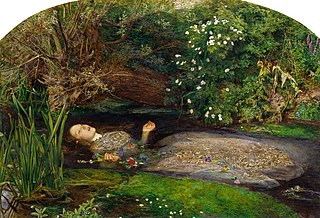
* Sir John Everett Millais, Ophelia(1852)
(A painting of an obvious suicidal subject can be veiled in such uplifting beauty. At once my eyes veered toward the throngs of bushes studded with flowers above the dying Ophelia, I was thus delusively convinced that her death appeared more like martyrdom. One feature sustains my perfunctory conjecture is the facial expressions of Ophelia, which shows her grotesquely in an absorbed ecstasy. The painting alludes to the analogy between death and the return to nature, and the viewers are only too tranquilized by this beautiful scene to be informed of its subsequence.)
Our beloved Cecilia passed away just last weekend. Before her folks shrouded the body carefully and laid it finally at rest under the sweet earth, Cecilia was said to be found floating face upward on a lake. The flesh no longer persisted in stiffening itself when the water eroded and seeped into the skin; glimpses of Cecilia’s somewhat pulverized bones were grotesquely visible under the beaming sun. The lake glistened placidly when caught by rays of light, for the quintessence of the bones was fully mingled with the water. The only moment in the girl’s ephemeral life when a posthumous glorification was reached; with all the refinement the greedy water elicited, it tumbled and rumbled in excitement.
Death, Angel and Demon held a congregation beside the cemetery. With his slender finger pointing skyward to forbid the other two from making any rash decision, Death was anxious to know the cause of Cecilia’s demise. The Angel sensed the fading aura of the girl while the Demon simply tasted a grab of earth around her grave; the two launched into several varied yet tragic possibilities of Cecilia’s death: sickness, murder, suicidal attempts, accidents, heroic martyrdom among many others. Being roused by a subsequent squabble between the good and the evil, something gave a slight quake from underneath where Death stood. The thing gave some tittering sound when Death stomped the earth suspiciously, so he pricked his ear.
The body spoke: I was born when a straying raven flitted across the red-imbued sky in agitation, thus I was told by some seer that my life would be doomed sooner or later- these words I took no notice but mere bluff. I passed my days rather serenely, for I was well aware of my termination- a definite spot with its abnormally short distance beguiled by a thronging haze before my eyes. Once my fate was irreversibly decided, I succumbed fully my body and soul. So blamed not the people that should carry a lifelong guilt, nor lamented an incident that occurred so untimely and sudden. The kind of bird I once was and always will be, whose wings were merely manoevured by a pair of invisible hands, or winds, as they swayed me by.
Child your face was ever bereft of emotions that left me puzzle over your true feelings. Why that uncanny smile still constantly lingered upon your mouth even when you were no longer breathing? Smiling still you shocked the gathered crowds when in tears we genuinely mourned. Therefore with your assent we built a wall around you, where nothing was penetrable except the air and the winds, descending leisurely up from above. I divined your pleasure of warbling in your roofless kingdom; I could almost see you craning your neck at the sky which seemed ever so far-fetched. You carried that uncanny smile everywhere, even when I, releasing you and finally laying you somewhere the sun always shines, and the sky so easily accessible- so near that you would suspect it turned liquid.
Death finally picked up his flute and played. Both Angel and Demon bowed to an unsolvable impasse of the eventual victory. The three were ready to escort Cecilia to her next chapter of life. For the present, here lay Cecilia the graceful, ever so contented, ever smiling. Living in solitude until the very end; without complaints.
Comments
Post a Comment